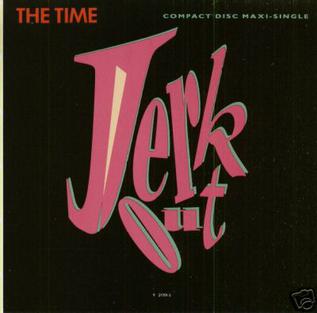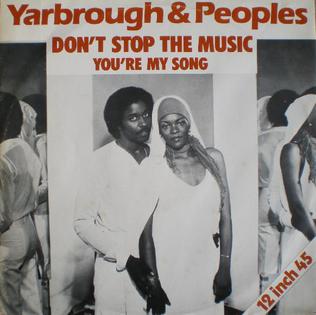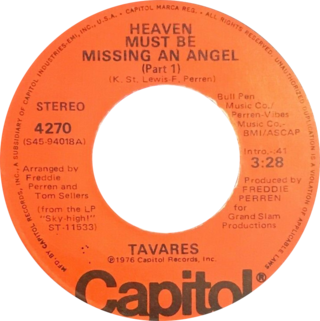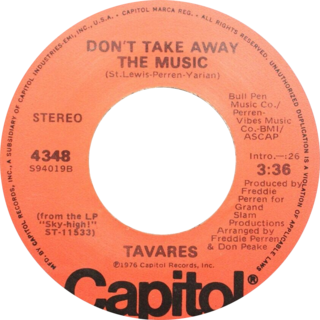Related Research Articles

"Controversy" is a song by American musician Prince, the lead single and title track to his 1981 album. The song addresses speculation about Prince at the time such as his sexuality, gender, religion, and racial background, and how he could not understand the curiosity surrounding him.

"Double Dutch Bus" is a funk song by Frankie Smith, made famous for its extensive use of the "izz" infix form of slang. It was released in February 1981, although some sources indicate 1980 as the original release date. The single capitalized on the concepts of the double-decker bus and the jump rope game called Double Dutch, popular with American children since the early 1970s. The song became a foundation of hip hop music and dance.

"You'll Never Find Another Love Like Mine" is a song written by Kenny Gamble and Leon Huff and performed by R&B singer Lou Rawls on his 1976 album All Things in Time. The song proved to be Rawls' breakthrough hit, reaching number 1 on both the R&B and Easy Listening charts as well as number 4 on the dance chart and number 2 on the US Billboard Hot 100. This was the first and only time that one of Rawls' records reached Billboard's pop Top Ten.

"Jerk Out" is a song from The Time's 1990 album Pandemonium. The song was originally recorded in December 1981 by Prince at his home studio during sessions for What Time Is It?. Prince originally performed all instruments and vocals and this recording remains unreleased. Prince reworked the song in the spring of 1985 for the band Mazarati. The song was ultimately left off the Mazarati album, though circulates among collectors. Again, the song was reworked in late 1989 for inclusion on Pandemonium and contains input by the band. Prince and Mazarati member Bruce DeShazer's backing vocals remain on the finished track.
"The Blues" is a number-one R&B single by the band Tony! Toni! Toné!. The song spent one week at number one on the U.S. R&B singles chart and peaked at number 46 on the Billboard Hot 100 in 1990. The single also peaked at number 43 on the Hot Dance Club Play chart, and number 92 on the UK Singles Chart.

"When She Was My Girl" is a 1981 single released by American vocal group the Four Tops. The song, their first release off Casablanca Records, helped to return the former signature Motown act to the American pop Top 40 charts, peaking at No. 11 on the US Billboard Hot 100, No. 10 on the Cashbox chart, and reaching No. 1 on the R&B charts.

"Don't Stop the Music" is a song by Yarbrough and Peoples, from the duo's 1980 debut album, The Two of Us. It was released as a single on Mercury Records in 1980.

"Take Your Time (Do It Right)" is the debut single by American R&B group the S.O.S. Band. It was released as the lead single from their debut studio album, S.O.S. (1980) on March 18, 1980 through Tabu Records, three months before the album's release.

"I'll Be Good to You" is a 1976 hit song by R&B duo the Brothers Johnson. George Johnson, one of the two Johnson brothers in the band, wrote the song after deciding to commit to a relationship with one woman, instead of dating several at a time. While George was recording a demo for the song, family friend Senora Sam came by and added some lyrics. Brothers Johnson producer and mentor Quincy Jones heard the song, liked it, and convinced George to sing lead on the finished track. Released from their debut album, Look Out for #1, it was a top-ten hit on the Billboard Hot Singles Charts, peaking at number three, and a number one song on the Billboard R&B Charts during the summer of 1976. The single was later certified gold by the RIAA.

"Give It to Me Baby" is a song written by American singer Rick James. Taken from his album Street Songs, the song charted on the Billboard Hot 100, spending two weeks at No. 40 and spent five weeks at No. 1 on the R&B chart. Two other tracks from Street Songs, "Super Freak" and "Ghetto Life", topped the American dance chart for three weeks in the summer of 1981. The song proved to be even more successful with R&B and dance club audiences. Part of the background vocals were sung by Temptations member Melvin Franklin.
"Share Your Love with Me" is a song written by Alfred Braggs and Deadric Malone. It was originally recorded by blues singer Bobby "Blue" Bland. Over the years, the song has been covered by various artists, most notably Aretha Franklin who won a Grammy Award for her 1969 rendition. Other artists who covered the song include The Band in 1973, Kenny Rogers in 1981, and most recently, Van Morrison in 2016.

"Heaven Must Be Missing an Angel" is a disco song written by Freddie Perren and Keni St. Lewis. It was recorded by the American band Tavares in 1976. It was released as the first single from their fourth album, Sky High! (1976), and was split into two parts: the first part was 3 minutes and 28 seconds in length, while the second part was 3 minutes and 10 seconds. "Heaven Must Be Missing an Angel" was re-released in February 1986.

"Funkin' for Jamaica (N.Y.)" is a song by jazz trumpeter Tom Browne. The single—a memoir of the Jamaica neighborhood in the New York City borough of Queens where Browne was born and raised—is from his second solo album, Love Approach. Browne got the idea for the song while he was at his parents' home. The vocals for the single were performed by Toni Smith, who also helped compose the song. The song hit number one on the US Billboard R&B chart for a month. "Funkin' for Jamaica" peaked at number nine on the dance chart and made the top 10 on the UK Singles Chart, but it never charted on the Billboard Hot 100.
"Stop to Love" is a song by American recording R&B/soul artist Luther Vandross. Released in 1986 as the lead single from his album Give Me the Reason. It was his first number-one single on the R&B chart since "Never Too Much" in 1981. The upbeat single was also a crossover hit, peaking at number fifteen on the Billboard Hot 100.

"Do You Love Me" is a song recorded by American singer-songwriter Patti Austin for her fourth studio album, Every Home Should Have One (1981). It was released in 1981 by Qwest Records as the album’s first single. Along with the track "The Genie", the single peaked at number one on the dance charts for two weeks. Although "Do You Love Me" failed to chart on the Hot 100, it peaked at number twenty-four on the soul singles chart.
"Inside Love " is a song written by Kashif, and performed by American R&B singer George Benson.
"Don't Let Go" is a song written by Jesse Stone. The song was first a hit for Roy Hamilton in 1958. The Roy Hamilton version reached number 2 on the R&B charts and number 13 on the pop charts.

"Two Hearts'" is a hit duet sung by American R&B singers Stephanie Mills and Teddy Pendergrass, from Mills' fifth studio album Stephanie (1981). The song was written and produced by James Mtume, Reggie Lucas and Tawatha Agee. Released in January 1981, the single reached number 40 on the US Billboard Hot 100 in 1981. On the US Billboard R&B chart, "Two Hearts" reached number three.
"Who Is He?" is a track from Bill Withers' 1972 album, Still Bill. The music was written by Withers along with Stan McKenny, who wrote the lyrics. The song has also been featured on the soundtrack of Quentin Tarantino's Jackie Brown.

"Don't Take Away the Music" is a hit song by R&B/disco group Tavares, released in the fall of 1976. It peaked at number 34 on the US Billboard Hot 100 singles chart and at number four in the UK. Along with the track "Heaven Must Be Missing an Angel", the song spent two weeks at number 1 on the Hot Dance Club Play chart.
References
- ↑ Whitburn, Joel (2004). Hot Dance/Disco: 1974-2003. Record Research. p. 213.
- ↑ Whitburn, Joel (2004). Top R&B/Hip-Hop Singles: 1942-2004. Record Research. p. 479.